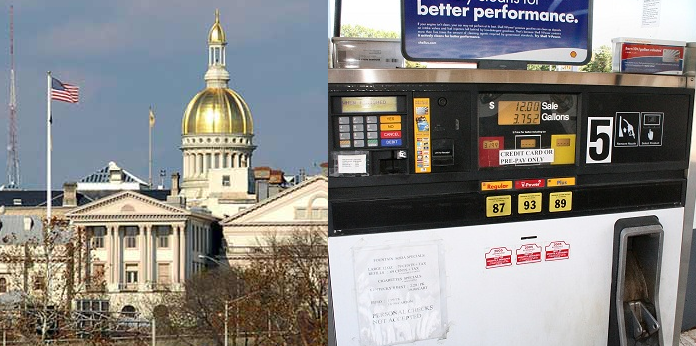
A4011 is up for consideration this Thursday before Assembly Transportation Committee, Save Jerseyans.
What does it do, exactly? I’ll let you read the explanatory statement (below), but it’s likely to be the largest single gas tax increase since the original Chris Christie-brokered 2016 package:
Under current law, the rate of tax imposed under the Petroleum Products Gross Receipts Tax (PPGRT) is annually adjusted by the State Treasurer to ensure that the State realizes a statutorily prescribed revenue target, more commonly referred to as the “highway fuel cap,” based on 2016 collections of highway fuel taxes. The cap amount is based on the Fiscal Year 2016 sum of: (1) the taxes collected on the 12.48 percent and four cent tax rates for highway fuels taxes, (2) the amount derived from taxing the gallonage of highway fuel subject to the four cent motor fuel tax, and (3) the amount that would have been derived from taxing the gallonage of highway fuel subject to the motor fuel tax at a rate of 23 cents per gallon. All revenues collected are deposited into the TTF to support transportation infrastructure projects and debt service on transportation bonds. This annual adjustment mechanism is currently set to expire at the conclusion of State Fiscal Year 2026.
The bill would modify this mechanism, beginning with Fiscal Year 2025, to gradually raise the highway fuel cap amount through Fiscal Year 2029. The amount of revenue required to be collected on highway fuel would be as follows: $2,032,000,000 in Fiscal Year 2025; $2,115,000,000 in Fiscal Year 2026; $2,199,000,000 in Fiscal Year 2027; $2,282,000,000 in Fiscal year 2028; and $2,366,000,000 in Fiscal Year 2029. If the actual revenues generated fall above or below the highway fuel cap amount set for the fiscal year, the rate of tax would be adjusted accordingly to ensure the highway fuel cap amount is realized.
The bill also provides that after the State Treasurer has determined the rate of tax pursuant to the bill, the new rate would take effect on January 1 of Fiscal Year 2025 through Fiscal Year 2029 rather than October 1, as is done under current law.
[Emphasis added.]
The immediate result is a guaranteed 10-cent increase in the first five years with the certainty of future increases down the road.
Skeptics from back then shouldn’t be blamed for remaining skeptical today. How has the 2016 gas tax hike panned out for taxpayers over the past eight year? According to an Office of Legislative Services (OLS) estimate obtained by Save Jersey, the purported effort to replenish the state’s Transportation Trust Fund resulted in a massive $534,806,973 net tax increase. Veteran Save Jersey watchers will recall that Christie’s deal with Sweeney was marketed as a “net reduction” in part because of a laughably small sales tax reduction to 6.625%.
Meanwhile, subsequent surveys and studies have confirmed that New Jersey’s roads and bridges weren’t appreciably helped by all of that new revenue.
There’s no reason to believe things will be different this time around. The new legislation appears to contain bailout provisions for NJ Transit at a time when Governor Murphy is already presiding over increased fares and hiking business taxes to rescue the troubled and corrupt public transportation system.
History always repeats itself. Only fools ignore its lessons.


